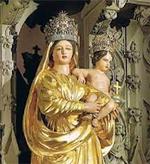Former papal nuncio found guilty of abuse, laicized
June 27, 2014
Jozef Wesolowski, the Polish prelate who was accused of sexual abuse while serving as apostolic nuncio in the Dominican Republic, has been laicized, after the Congregation for the Doctrine of the Faith found him guilty of the charges.
The disciplinary sentence of laicization (popularly known as defrocking) was announced by the Vatican on June 27 at the conclusion of a canonical trial. Wesolowski will now have two months to appeal the sentence. At the conclusion of that period, he will be subject to criminal trial. Archbishop Wesolowski was recalled to Rome in August 2013, after Cardinal Nicolas Lopez Rodriguez informed Pope Francis that he had heard reports of sexual abuse by the Vatican envoy. As a citizen of the Vatican city-state, he is subject to criminal trial before a Vatican court.
Civil authorities in the Dominican Republic had also investigated the sex-abuse allegations, and announced that they had found significant evidence against the Polish prelate. Prosecutors in Poland had also opened an investigation. The Vatican had promised to cooperate with both countries, but observed that Wesolowski was subject first to the Vatican’s criminal code.
In announcing the archbishop’s laicization, the Vatican press office disclosed that while the canonical case against him had been pending, Wesolowski had “been granted relative freedom of movement.” In light of the verdict against him, the Vatican said that “all the necessary procedures will be adopted in relation to the former nuncio, in conformity with the gravity of the case.” That statement from the Vatican was obviously intended as a response to recent reports that a bishop from the Dominican Republic had seen Wesolowski walking around Rome, apparently at liberty. Father Federico Lombardi, the director of the Vatican press office, said that now “measures will be taken to ensure he resides in a specific place with restrictions and that he does not have any freedom of movement because he has been charged with a very serious offence and is awaiting further legal proceedings.”
Since his return to Rome last year, the Vatican had not offered any official comment on the charges against the former nuncio, nor had there been any statement released about the prelate’s response to the accusations. But Pope Francis had told reporters, during a conversation on his return flight from the Holy Land in May, that three bishops were under active investigation.
For all current news, visit our News home page.
Further information:
- Canonical Trial of Ex Nuncio Jozef Wesolowski (VIS)
- Former papal nuncio Wesolowski defrocked (ANSA)
- Vatican Ex-Ambassador Convicted of Sex Abuse (AP)
- Former Nuncio Wesolowski reduced to lay state following paedophilia accusations (Vatican Insider)
- Archbishop accused of abuse is reportedly at liberty in Rome (CWN, 5/24)
All comments are moderated. To lighten our editing burden, only current donors are allowed to Sound Off. If you are a current donor, log in to see the comment form; otherwise please support our work, and Sound Off!
-
Posted by: John J Plick -
Jun. 29, 2014 10:16 AM ET USA
I can understand why "people still complain.." This whole thing, although I agree that it constitutes a strong step forward, bears strong similarities to the Myers/Fugee scenario in Newark, New Jersey. Father Fugee "should have been" under the jurisdiction & direct supervision of that Archdiocese, but he was not. Sins of the flesh are often powerful addictions that are not broken easily. This known reality is hard to reconcile with Rome's 2000 yrs of practical experience in dealing with same.
-
Posted by: 1Jn416 -
Jun. 28, 2014 7:22 PM ET USA
The comments on this article surprise me. This is the first time a bishop has been found guilty of child abuse in a canonical trial and laicized, and now will face a criminal trial. This is being handled well, yet people still complain. As to his being tried at the Vatican, remember he was an ambassador and so had diplomatic immunity. It remains possible the Vatican could allow him to face charges in the Dominican Republic.
-
Posted by: jg23753479 -
Jun. 27, 2014 7:49 PM ET USA
If he were in the Dominican Republic where he committed the crimes he is accused of, he would probably be in jail, not under some kind of house arrest. And I agree with the other comment here to the effect that we need an explanation of how this man got into the position he held. Who appointed him? And who trusted him enough to keep him in office?
-
Posted by: feedback -
Jun. 27, 2014 2:24 PM ET USA
The big questions still remain: how did this individual become a bishop and then a Vatican diplomat? Is there a lavender network that proposed him to the Pope for promotions?







